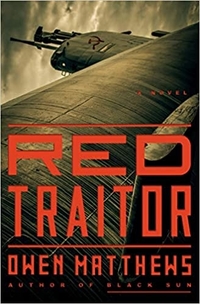Red Traitor by Owen Matthews
 Wednesday, August 11, 2021 at 7:26AM
Wednesday, August 11, 2021 at 7:26AM 
Published by Doubleday on July 20, 2021
Notwithstanding its unfortunate title, Red Traitor is a smart, entertaining spy novel that is told from an unusual perspective. Although a few American characters appear, the protagonist and most of the key characters are Russian. The story primarily alternates between Moscow and a Russian submarine near Cuba. The events are loosely based on a Cold War incident in which Russian submarines were armed with nuclear torpedoes, and on a Russian (the traitor in the title) who provided clandestine information to the United States.
The novel takes place during the Kennedy Administration. Russia is establishing a military presence in Cuba and America is on the brink of war. The more important war that the story showcases is between two intelligence agencies in the USSR: the KGB and the GRU.
Alexander Vasin is a lieutenant colonel in the KGB and a favorite of his superior, Lieutenant General Yury Orlov. Vasin became a favorite by blaming a problem on an American spy. While the details of Vasin’s previous mission are described in Black Sun, it isn’t necessary to read Black Sun to understand Red Traitor.
Vasin invented the American spy, but Orlov doesn’t know that, or perhaps doesn’t care. Orlov’s mission is to undermine General Ivan Serov, head of the GRU and his chief rival for power. To that end, Orlov wants to prove that the spy works for Serov. Orlov has a candidate in mind — Oleg Morozov, a colonel in the GRU — but has only circumstantial proof that Morozov is a traitor. Orlov wants Vasin to find evidence that Morozov is a spy and isn’t overly concerned whether the evidence reflects reality.
Morozov has been behaving suspiciously, in part by collecting information from Sofia Guzman, a translator who has access to information about a secret project. The project involves the installation of long-range missile bases in Cuba. News of the project has made its way to American intelligence, making Morozov the likely source of the leak.
Vasin learns of a related project — the arming of submarines with nuclear torpedoes that are sailing to Cuba. Kennedy is creating a naval blockade around Cuba. A Russian lunatic, without the knowledge of Khrushchev, has ordered the submarine commander to launch the torpedo if the Russian subs are attacked while trying to run the blockade. Vasin knows that this will trigger a nuclear war and the likely destruction of Russia. He resolves to use his own initiative to stop the war, even if doing so might make him a traitor.
Part of the action takes place on one of the subs, where the fleet commander is at odds with a submarine captain who is eager to fire the first strike. Much of the novel’s tension comes from that underwater conflict, although Vasin’s tricky relationships with Orlov, Morozov, and Guzman add to the drama.
Like Black Sun, Red Traitor succeeds in part because the story is based on real events and in part because Vasin is a dark character who does not equate loyalty to his county to loyalty to autocrats who are willing to harm his country to achieve their personal ends. Owen Matthews keeps the various plot elements in constant motion, building suspense that is only partially tempered by the reader’s knowledge that nuclear war did not break out in 1962. Exactly how that war will be prevented, however, is something that the reader won’t know until late in the novel. The second Vasin novel is as strong as the first, making Matthews’ unusual look at espionage from a Russian perspective a good choice for fans of spy fiction.
RECOMMENDED
 TChris |
TChris |  Post a Comment |
Post a Comment |  Owen Matthews,
Owen Matthews,  spy in
spy in  Thriller
Thriller 


